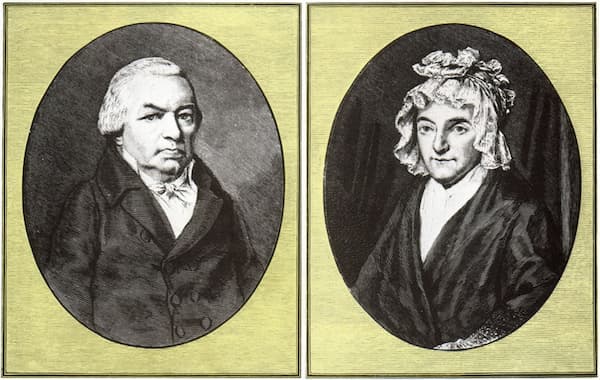As if we musicians don’t have more than our share of challenges to contend with, we heard the recent story of the energetic and exultant conductor who kicked a soloist’s violin right out of his hands. The Czech violinist, classical, rock, and crossover artist Pavel Šporcl, also known as Blue Violin Man, was performing Mendelssohn Violin Concerto during a 60th-anniversary concert for the Mlada Boleslav Chamber Orchestra. The conductor Marko Ivanovic, a bit over-the-top with his gestures, lunged left to give a cue.
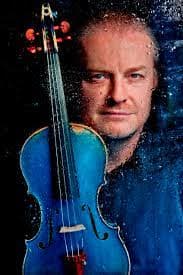
Pavel Šporcl, Blue Violin Man
And then the nightmare happened. Marko’s baton hit the violin. It careened out of the soloist’s hands and plunged to the floor. With split-second timing, Šporcl stuck his foot out and broke the fall of the violin. Disaster averted. It even retained its tuning. The concert could continue, although I imagine Šporcl’s tempos were much faster—no doubt due to his racing heart!
Mendelssohn: Violin Concerto (Pavel Sporcl)
Šporcl will soon be performing Dvořák Violin concerto with the English Chamber Orchestra in London’s Queen Elizabeth Hall. Let’s hope the blue violin stays in his hands.
It reminds me of this story about British television personality and former M.P. Gyles Brandreth. In 1970, Gyles Brandreth produced his first documentary film to mark the 800th anniversary of the murder of Thomas Becket. It was filmed in Canterbury Cathedral, where it is said Becket died. Famed violinist Yehudi Menuhin agreed to play unaccompanied Bach for the film. Although Menuhin arrived with his precious Stradivarius violin padlocked to his wrist, which was required by the insurance company, and understandably, Menuhin took great care of the instrument, he didn’t hesitate to allow the producer to hold the violin for a minute. Misguided trust! The violin slipped out of Brandreth’s hands and careened down the old stone steps of the crypt, landing with a crash. Menuhin calmly walked down the steps to see the damage. After looking at the chards, he indicated he’d have to use another violin. Fortunately, he had another one with him, but Brandreth never forgot this painful episode. The Strad is now repaired, of course, and is housed in the museum at the Royal Academy of Music in London.
J.S. Bach: Violin Sonata No. 1 in G Minor, BWV 1001 – II. Fugue: Allegro (Yehudi Menuhin, violin)
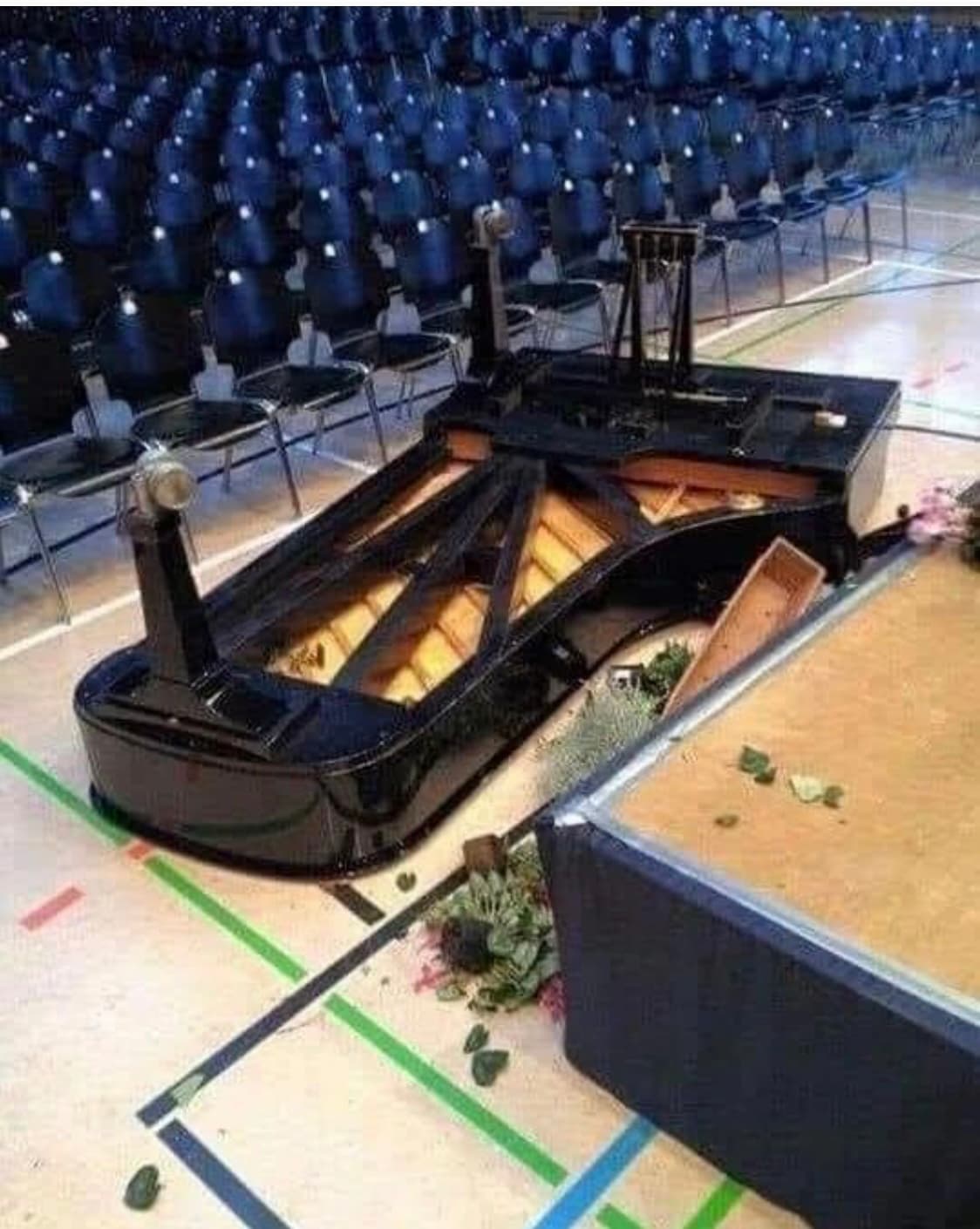
A piano falls
There are more horror stories of piano crash landings than you would think! In the autumn of 2015, Austrian pianist Stefan Vladar was about to perform the Brahms Concerto in B-flat when, during the concert in Frickingen, Germany, the Steinway grand piano slipped off the stage—an unforgettable sound no one wants to hear. The stage technicians responsible for building the podium had underestimated the weight of the concert grand, and the edge of the wing-stage buckled. Incredibly, the frame and the entire mechanics of the Steinway withstood the impact. Later, the lid and legs had to be replaced, but that evening, once the piano was righted, 90 minutes later, the concert continued.
Another well-known calamity had a much more unfortunate ending. The brilliant Canadian pianist and Bach specialist Angela Hewitt owned a one-of-a-kind Fazioli F278 piano with, unusually enough, four pedals and valued at almost $200,000. It had an amazing sound. Each instrument is unique, but this one was especially dear to Hewitt. She’d bonded with this handmade instrument, and having become accustomed to the response and sound quality, she would transport the piano with her when she did her recordings. The accident happened in late January 2020. She had just recorded the Beethoven Piano Variations in a studio in Berlin for Hyperion Records, including the centerpiece: 15 Variations and a fugue on an original theme, “Eroica” Op. 35.
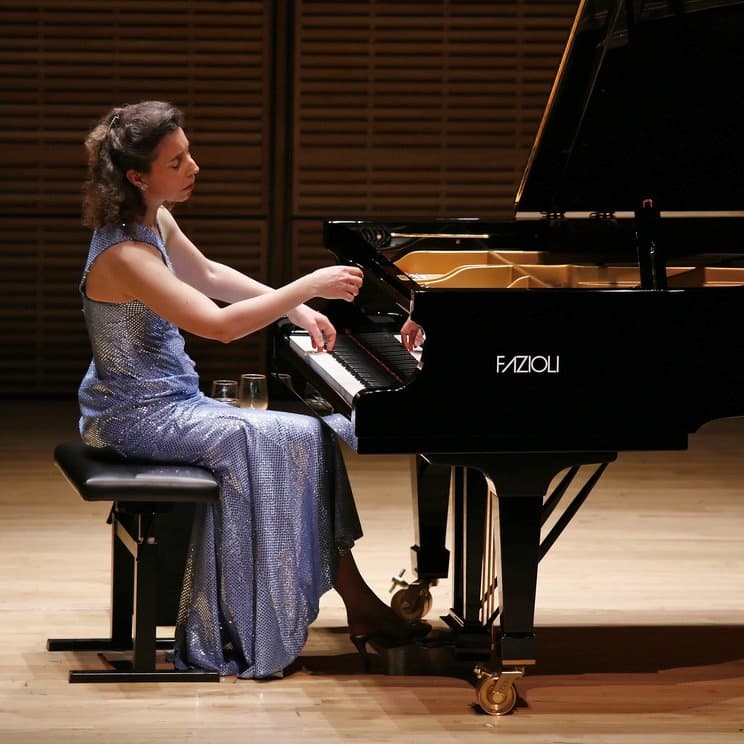
Angela Hewitt and Fazioli from the Lucerne festival © Richard Termine
The movers tried to lift the 590kg (1,300 pounds) onto a trolly, and they dropped it—the iron frame of the piano irrevocably shattered, the piano lid splitting in two. The movers were mortified, but Hewitt was grief-stricken. This instrument is the piano that she had in her home in Italy, and it is the piano that can be heard on all her European recordings from 2003 onwards, including a wonderful rendition of Bach’s Six Partitas. Listen to the fluency in the Gigue of the B-flat Partita. Eventually, Hewitt chose another Fazioli piano.
Beethoven: Eroica Variations, Op. 35 – Finale. Alla fuga (Angela Hewitt)
J.S. Bach: Partita No. 1 in B-Flat Major, BWV 825 -VI. Gigue (Angela Hewitt, piano)
Musicians nervously make jokes about such incidents, “Should’ve pressed the brake pedal instead of the damper pedal!” or “It jumped. It wasn’t pushed!”
But here’s some trivia—when a piano was deliberately dropped, leading to the establishment of Sky River Rock Festival and eventually to Woodstock.
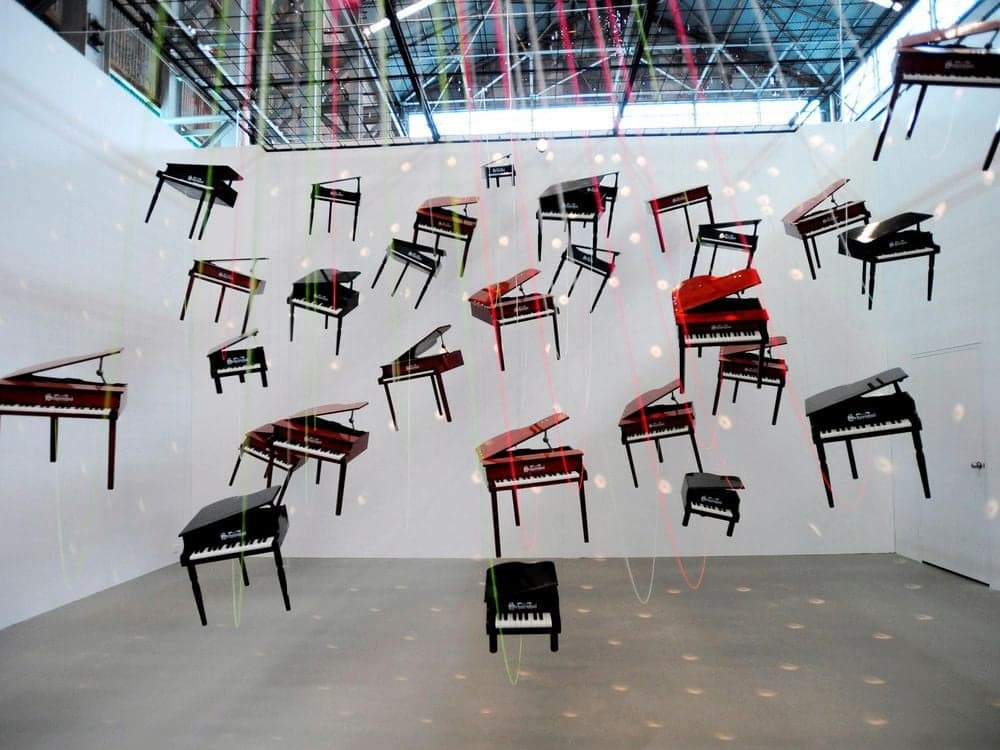
Display of multiple pianos: Smithsonian Magazine
Erin Blakemore, Correspondent
April 24, 2015
© TRACEY NEARMY/epa/Corbis
In the 1960s, in Seattle, two musicians, Larry Van Over and Gary Eagle, were moving a piano when it fell off the truck. Their reaction might surprise you. “It sounded kind of cool,” they thought, and so began a search for a venue where they could drop a piano during a concert. As one would expect, the places they contacted balked at the thought of demolishing a piano for show. The two contacted a newspaper, hired Country Joe and the Fish, a music group, and set out to do the deed in a field from a height, a great height. From a helicopter. On April 28, 1968, the Piano Drop occurred in the tiny town of Duvall near Seattle.
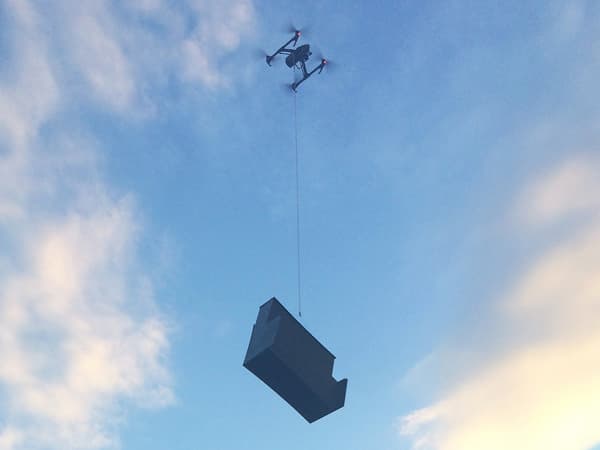
The 2017 SummerStage Piano Drop. © Lisa Allen, The Woodinville Weekly
The stunt was almost foiled. As the pilot got ready to drop the 500-pound piano, the pilot’s nerves got the better of him as he hadn’t bargained for the huge crowd of thousands of people below who showed up to watch. What if it landed on the crowd? For a few minutes, the piano and the helicopter swayed back and forth before the piano was released. It landed on a grass mound, making little noise. The organisers were disappointed with the sound, but they thought, if this stunt could attract so many people for one band, how many might come for a multi-day festival of outdoor concerts with several performers? That’s how the Sky River Rock Festival was born, the precursor of, in August of 1969, Woodstock Music & Art Fair and many other outdoor gatherings that overwhelm pastures and parks, where no-holds barred behavior is condoned and even celebrated.
Sadly, since then, dropping and trashing an instrument, especially a piano, has become not only a fad but a tradition. MIT students (Massachusetts Institute of Technology) since 1972, have instigated the now famous Baker House Piano Drop. My heart stops when I watch this.
Piano Drop @ M.I.T. ~ 4. 27. 2017
We musicians look upon our instruments as precious friends with whom we have a very long relationship through many years of concertising. Our instrument is so much more than our tool. The instrument speaks for and through us, communicating wordlessly when words do not suffice. When one chooses an instrument, it is akin to choosing a partner, “To have and to hold, ’til death do us part!” Excuse me while I handcuff my cello to my wrist!
For more of the best in classical music, sign up for our E-Newsletter



